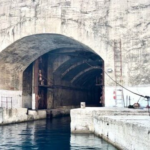Around 5:30 AM on Sunday, Serbian police forces cleared protesters who had blocked two railway stations in central Belgrade since the evening of August 10.
The protesters had shut down the “Belgrade Center – Prokop” and “New Belgrade” stations after staging a demonstration in the city center against plans for a lithium mining project. A protester told the Beta news agency that during the intervention, police used shields to remove protesters from the “Belgrade Center – Prokop” station.
The Ministry of Internal Affairs stated that, “in accordance with Serbian laws and legal powers,” railway traffic had been restored.
Additionally, it was announced that police have initiated legal proceedings against all participants for obstructing international public traffic and endangering public safety.
During the August 10 protest, demonstrators initially marched through the city center before heading to the Gazella Bridge. There, they split into two groups and proceeded to the railway stations.
Thousands gathered for the protest organized by the Alliance of Environmental Organizations of Serbia, as the government had not met the protesters’ demand for a law to be enacted within 40 days to ban lithium mining and the opening of mines in the Jadar River valley, in western Serbia, by the Rio Tinto company.
Activist and one of the protest organizers, Zlatko Kokanović, stated on August 10 that the blockades would continue until the request for a law prohibiting the extraction of boron and lithium is approved.
According to him, the blockades would be organized at three to five other locations in various cities across Serbia.
Following the August 10 protest, Rio Tinto assessed that “an intensive disinformation campaign against the Jadar project is underway, spreading false news and unfounded claims that the project will have a devastating impact on the environment and human health.”
Serbian President Aleksandar Vučić and other high officials have claimed that the main goal of the protest is the “overthrow of the government.”
Vučić has consistently spoken positively about the “Jadar” project, stating that the lithium mine should commence operations by 2026, provided that “guarantees are offered that the environment and human lives will not be endangered.”
On August 6, Serbian Health Minister Zoran Lončar introduced a team of health experts who, according to him, will assess the impact of the lithium mine on human health.
Several local and foreign experts believe that the lithium extraction process is accompanied by environmental consequences, such as water and soil pollution.







